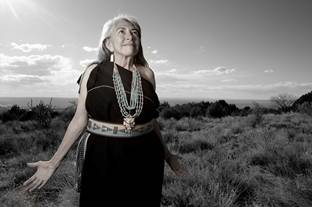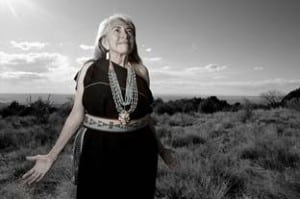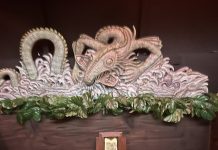
Submitted by Tacoma Art Museum

Seattle-area photographer Matika Wilbur, Swinomish and Tulalip, in collaboration with Tacoma Art Museum, has been awarded a 2015 Artists Engaging in Social Change grant from Surdna Foundation.
The foundation received more than 1,000 grant applications, and Wilbur is one of just 15 artists awarded through the program, receiving a grant of $157,000 (the largest award). The grant will support Wilbur’s “Project 562,” a nation-wide endeavor documenting contemporary Native American culture through photographic portraits and narratives from each federally recognized Native American tribe. “Project 562” is the basis for compelling exhibitions, presentations, articles, books, and curricula that creatively surmount stereotypical representations, historical inaccuracies, and the absence of Native American images and voices in mass media and the national consciousness.
The inaugural exhibition of “Project 562” debuted in spring, 2014, at Tacoma Art Museum, receiving rave reviews from museum visitors and in regional and national press. More than 18,000 visitors saw the exhibition. TAM served as Wilbur’s fiscal sponsor, which enabled her to participate in the highly competitive grant program.
Wilbur’s beautifully rendered portraits and stirring recordings from select sitters examine the Indian image across socioeconomic and intergenerational spectrums, from tribal to hardcore urban, traditional elders to assimilated teens, conveying the diversity among Native communities and individual experiences. Her provocative work exposes the strength and richness of contemporary Native life, and is profoundly shifting consciousness toward Native Americans. The project conveys the cultural diversity among Native communities and individual experiences.
The Surdna Foundation grant is an affirmation of the power of Wilbur’s work. “I am overwhelmed with gratitude for the Surdna Foundation’s support,” Wilbur said. “Their contribution will fundamentally improve our team’s efficiency and dramatically increase public access of “Project 562.” For hundreds of years, our ancestors have been calling for authentic stories of our people to be told. I believe that “Project 562” is being guided and protected by our ancestors, and we raise our hands to the Surdna Foundation as a source of strength and for believing in our mission to change the way we see Native America.”
To date, Wilbur has driven over 150,000 miles across the United States and visited about 300 of the 567 federally recognized tribes in the United States. She has been welcomed into rare experiences and allowed images, voices, and ideas that have never before been represented.
Rock Hushka, TAM’s Chief Curator, affirms Wilbur’s role as an inspired and unprecedented messenger: “We are grateful to Surdna Foundation for recognizing the quality and power of Matika’s work with this grant award. She has a rare combination of immense creativity, tenacity, and tremendous sensitivity. ‘Project 562’ provides crucial cultural understanding, capturing with unparalleled clarity the vibrancy of contemporary culture along with political and social issues of primary concern to Native Americans across the nation. We look forward to a continued relationship with this remarkable artist and future iterations of ‘Project 562.'”
Surdna Foundation’s Artists Engaging in Social Change grants are designed to support individual artists, culture bearers, and nonprofit organizations whose work helps to inform, engage, or challenge people around specific social issues. Projects receiving funds were selected for the quality of the artistic practice and dedication to exploring critical themes that arise from, or impact a community; and for the project’s capacity to enable social change.
Surdna Foundation’s President Phil Henderson commented, “In an era of accelerated and often dramatic social and demographic change, artists and culture bearers play critical roles within our communities helping us understand and challenge pressing issues. Their visions, communicated through film, performance, text, spoken word and other forms can help communities achieve a sense of connectedness and common purpose.”


































